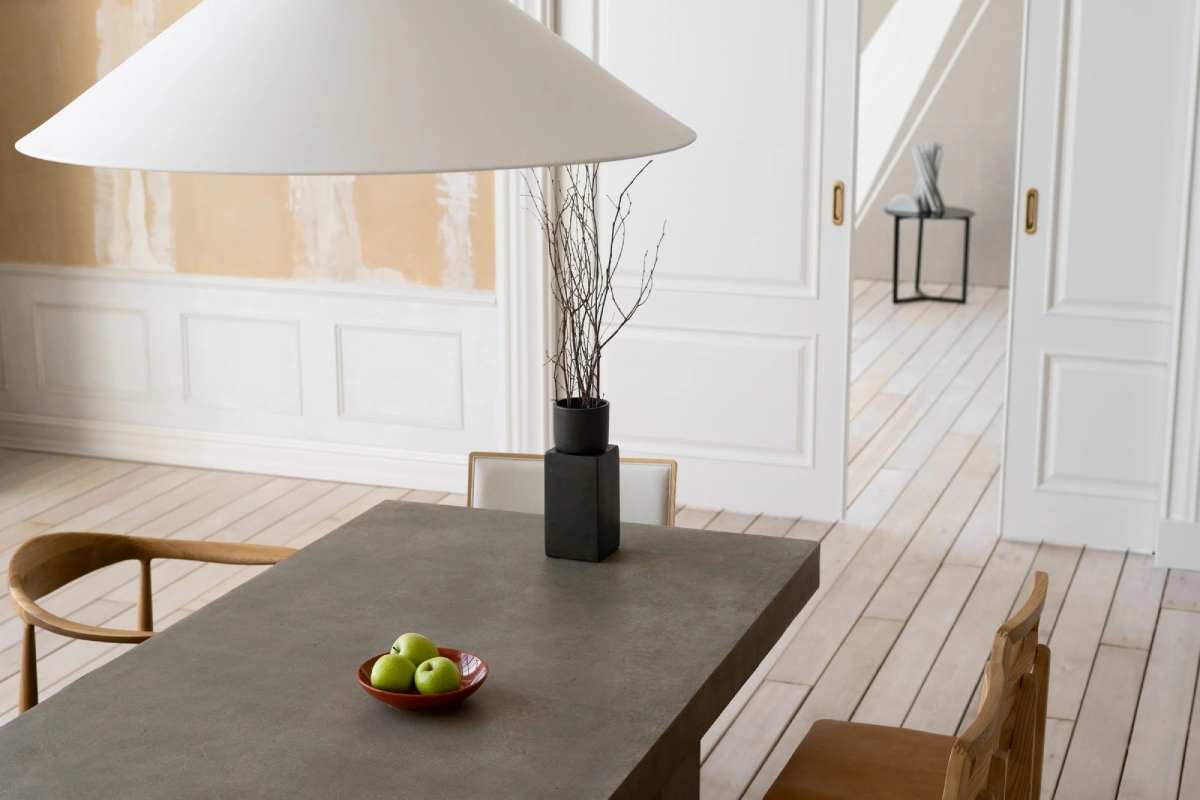Are you curious about minimalism? It’s a concept that has recently gained popularity, although it has been around for centuries. You may have noticed it in mainstream media, Netflix documentaries, and various industries such as fashion, design, food, technology, beauty, and housing.
But let’s get to the heart of it. What exactly is a minimalist lifestyle? Originally linked to art and design, minimalism has evolved into something much more meaningful.
In essence, a minimalist lifestyle means focusing on what truly matters in your life and having the courage to let go of the rest. By eliminating the unnecessary, you create more time and space for the things that bring you joy and fulfillment. It’s the philosophy of “less is more.”
In today’s fast-paced world, our lives are far from minimalist. We often find ourselves overwhelmed by distractions, making it difficult to appreciate simple pleasures like spending quality time with loved ones, pursuing hobbies, or simply enjoying some quiet moments.
The constant presence of physical, digital, and mental clutter leaves us feeling stressed and dissatisfied. Interestingly, scientific studies have shown that clutter can increase cortisol levels and hinder our ability to focus.
That’s where minimalism comes in as an antidote to overwhelm. It offers a way to simplify, prioritize, and even live a healthier life.
Let’s explore the world of minimalism together and discover how it can transform our lives for the better.
Common Misconceptions of a Minimalist Lifestyle
Misconceptions about a minimalist lifestyle are quite common, but addressing these misconceptions can provide a clearer understanding of what minimalism truly entails.
Let’s go over eight of these misconceptions and provide some corresponding clarifications:
Minimalism is stark and barren
Many people associate minimalism with empty white rooms and a lack of personal expression. However, minimalism is not about living in barren spaces. It’s more about intentionally curating meaningful and beautiful items that align with one’s values and creating a space that reflects what’s most important and brings joy.
Minimalism is boring

Some may perceive minimalism as dull and devoid of excitement. On the contrary, minimalism offers the opportunity to remove mundane tasks and distractions, providing more time and energy for activities that truly bring joy and fulfillment. Minimalists have the freedom to choose their own pursuits and create excitement in their lives.
Minimalists don’t own nice things
Another misconception is that minimalism means giving up owning nice possessions. In reality, minimalism often leads to owning higher quality items because individuals focus on buying fewer but better things. Minimalists prioritize value and quality over quantity.
Minimalists are lazy
While some may associate minimalism with laziness or lack of productivity, many minimalists are highly motivated individuals who pursue meaningful work and carry responsibilities similar to those who don’t embrace minimalism. Minimalism allows individuals to prioritize their time and energy on what truly matters to them.
Minimalists are extreme environmentalists
It’s true that minimalism promotes consuming and discarding fewer resources, which benefits the environment. However, not all minimalists adopt this lifestyle solely for environmental reasons. They may embrace minimalism for various personal motivations, such as seeking simplicity, contentment, or better relationships.
Minimalists are vegetarians/vegans

Minimalism is not inherently tied to dietary choices. Minimalists come from diverse backgrounds and lifestyles, and their dietary preferences can vary widely.
Minimalists are young and single
While minimalism may have gained popularity among young individuals, people of all ages and life stages can embrace a minimalist lifestyle. In fact, some individuals who discovered minimalism later in life wish they had done so sooner. Minimalism is relevant and beneficial regardless of one’s age or relationship status.
Minimalist Living – How Science Backs it Up!
The minimalist mindset offers numerous life-changing benefits that can positively impact various aspects of one’s life. Let’s explore some of the key benefits that are supported by scientific research and expert opinions:
Reduced stress and anxiety
Minimalism helps in reducing clutter, which research has shown to be associated with elevated cortisol levels and increased stress. By maintaining a tidy and uncluttered living environment, individuals can experience better moods and lower cortisol levels.
Increased productivity and focus
Living in an organized and simplified space has been found to improve cognitive function and allow the brain to focus better. By removing visual clutter, individuals can experience increased productivity, improved information processing, and reduced mental fatigue.
Financial savings

Embracing minimalism involves cutting back on unnecessary purchases and finding satisfaction in what one already owns. This approach can lead to financial savings by reducing expenses on unnecessary goods, housing, and heating costs. Additionally, selling unwanted items can provide extra income.
Reduced cleaning and tidying
Having fewer possessions and clutter translates to less time spent on cleaning and organizing. Studies have shown that decluttering can eliminate a significant portion of housework, freeing up time for other activities.
Increased happiness and satisfaction
Minimalism promotes a shift away from materialism, which has been linked to greater dissatisfaction in life. By focusing on experiences rather than possessions, individuals often report higher levels of happiness and life satisfaction.
Improved mental health

By reducing stress, anxiety, and distractions, a minimalist lifestyle can contribute to improved mental well-being. Minimalism encourages intentional living and cultivates a sense of peace, contentment, and mindfulness.
Enhanced clarity and focus
With fewer physical and mental distractions, individuals can gain clarity on their priorities and focus on what truly matters in their lives. This allows for more effective decision-making and pursuit of goals.
Better relationships
Minimalism prioritizes meaningful experiences and connections over material possessions, fostering stronger and more authentic relationships. By investing time and energy in building deeper connections with loved ones, individuals can experience greater overall satisfaction.
Adopting a minimalist mindset involves simplifying and decluttering both physical and mental spaces. It entails intentionally focusing on what brings value to one’s life, allowing for a more fulfilling and purposeful existence.
Getting Started With Your Minimalism Journey…
Getting started with a minimalist lifestyle is about embracing simplicity, decluttering your life, and prioritizing what truly matters to you. Here are some easy and friendly steps to begin your minimalist journey:
Shift your mindset
Minimalism is not just about getting rid of things; it’s a mindset that focuses on what brings value and joy to your life. Start by understanding that minimalism is a personal journey, and there is no one-size-fits-all approach.
Identify your values

Reflect on what truly matters to you. Determine what areas of your life feel cluttered or stressful and what you want to prioritize. This can include aspects like financial security, quality relationships, personal growth, career development, or more free time.
Start small
Begin by decluttering a specific area or category, such as your wardrobe, kitchen, or workspace. Take a look at each item and ask yourself if it serves a purpose or brings you joy. Let go of things that no longer align with your values or that you no longer need. Repeat this process in other areas of your life.
Practice moderation
Embrace the principle of moderation by avoiding excess and extremes. Find balance and simplicity in your life by being intentional about what you truly need versus what are merely extras. Focus on the things that hold true value for you.
Emphasize efficiency
Strive for efficiency by reducing waste and excess in your daily routines. Streamline and simplify your habits and systems to make the most of your time, energy, and physical space. Work smarter, not harder.
Take it one step at a time

Don’t feel overwhelmed by trying to declutter your entire life at once. Start with one room or one category and gradually progress. Create a reasonable timeline that fits your schedule and responsibilities. Celebrate the progress you make along the way.
Fix what bothers you
Identify and address the things that bother you in your day-to-day life. Whether it’s an overflowing inbox, a cluttered workspace, or a disorganized schedule, taking action to fix these small issues can have a positive impact on your overall well-being.
Embrace the journey
Remember that minimalism is a journey, not a destination. It’s about simplifying your life in a way that aligns with your values and priorities. Be patient with yourself, embrace the process, and enjoy the benefits of a more intentional and fulfilling lifestyle.
To Top It Off…
Minimalism has been shown to have varying impacts on individuals, with particular benefits observed among low-income participants and older individuals, based on research findings. For instance, voluntary simplicity has been found to enhance life satisfaction in low-income participants, while the correlation was less pronounced in high-income participants.
To summarize, minimalism provides a potential pathway to happiness and personal growth by reducing clutter, prioritizing values, and improving psychological well-being. By simplifying our lives and letting go of unnecessary possessions, we create space for what truly brings us joy, contentment, and fulfillment. It encourages us to shift our focus from material possessions to experiences, personal development, and the pursuit of a meaningful life. So why not embrace minimalism and discover the benefits it can bring to our lives?









[…] Uniqlo x JW Anderson collections feature a harmonious blend of minimalism and unexpected details. Clean lines and simple silhouettes are elevated with playful prints and […]